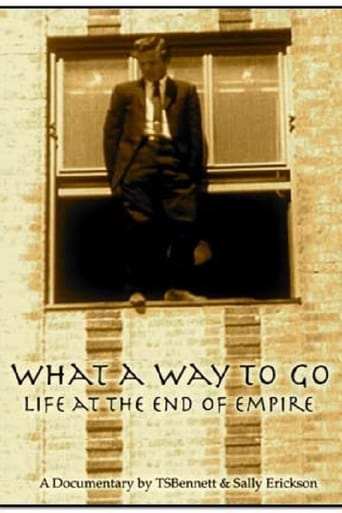s0ulf00d
This film is tough to watch. It is information dense and the narrative is fast-paced throughout the two-hour length. Watching it by re-playing bits of it, pausing in-between to read about the people interviewed and the books they've written will take better part of an entire day. But it is that good. Even if you think you know about these issues inside out, you should still watch. I made the mistake of letting it sit on my computer for a long time. Even after starting to watch a couple of times, I lost interest after a few minutes as I was put off by the lack of pauses that allow you to assimilate what was just said and also because I did not find any new information in the first 20 min of it or so. It is only in my third attempt that I managed to watch it in full and realised that it goes much deeper than other films. The first 18-20 min is about the personal struggle of the film maker. The conflict that comes from trying to live an ordinary life with a back-of-the-mind awareness that at some level things are deeply wrong. It's the double life we all live, those of us who understand the severity and scale of these crises but do not know what to do about it. The next 40 min or so is about the crises, categorised here into peak oil, climate change, mass extinction and population overshoot. Then it goes deeper into the ancient origins of the problems, the part that was most revealing. It then explains how modern science and technology perpetrated the "fantasy of no limits", gave us a false sense of control, argued that technology is not neutral, and that technology fixes do not always work in the long run. There's much more. You'll have to watch it for yourself. A word of thanks to the film makers for making this documentary and making it available on YouTube.
MrMajestik
This doc just supports and solidifies what I already have learned, observed, researched, pondered, read, and realized for the last 30 years... And sadly, no, Jesus is not coming to save us! The only thing that keeps me from laughing and stating the proverbial "I told you so," is the fact I have a 6 1/2 year old son (who I love much more than Jesus), he breaks my heart with his love and concern for the planet already, asking and reminding me to recycle... while I know that unchecked population growth and capitalism will destroy what once was a unique and beautiful planet, and likely leave him a unpleasant future. We have only ourselves to blame...
leycec
Conceivably, WaWtG:LatEoE (or, "whatgulateoe") is the most important film of our time. As other reviewers comment, it is not necessarily the most well-crafted film. It isn't. The editing is flawed; the pacing, disjoint.What it is, however, is the most ruthlessly honest film ever put to cinematography. From the earnest poetically hushed script-writing and narrator delivery to the relentless, factual interviews with scientific luminaries, authors, and journalists, WaWtG:LatEoE weaves the sordid story of... collapse. From the weft of everyday intuition and despondency, it incrementally and with examined force unravels the mass predicaments of industrial civilization. In no order, these are:* Peak oil. Global oil production peaked at 74.87 mbpd (million barrels of oil per day) on July 11th, 2008 - our so-called "Peak Oil Day," in hindsight.* Climate change. (I don't believe we need to discuss this one...)* Biodiversity loss. Anthropogenic species extiction is roughly 10,000 times the background rate, at an estimated 100 species per day. By contrast, the sum number of distinct species on Earth is estimated at only 10,000,000 species. Do the math.* Human overpopulation. The human population is currently growing at 94,000,000 humans annually. Human population growth has obeyed an exponential curve for the past 13,000 years: the so-called "Holecene." Unfortunately for the human population, the Earth is a finite planet.* Economic depression. At the tail end of quarter one of 2010, gross sovereign debt of the United States of America is an estimated 87.3% of GDP. If you think this is a sustainable trajectory, I have a Nigerian banker who would like to speak with you.In sum, the prognosis is bleak. If the 20th century was the Age of Exuberance, the 21st century will, with all likelihood, be the Age of Consequences. And the unpaid debt on those consequences is coming due.Humbly yours, Cecil Curry [ http://raiazome.com ]
Wisetroll
Now aside from the director's glum sounding narration (and with the gravity of the subject is warranted) this film is very engaging and thought provoking. Unlike Leonardo DiCaprio's 11th Hour and Al Gore's Inconvenient Truth, this film delves deep into why no technology will save us from the impending collapse of industrial civilization. The director focuses on four main crises: Peak Oil, Climate Change, Mass Extinction, & Population Overshoot. Among other things you'll learn: How oil is embedded in our food production and when it's gone so is our food; How extinction rates are one thousand times greater than normal background extinction rates; How agriculture itself is inherently unsustainable; How earth can only support one billion humans without petroleum; How the myth of the technofix keeps everyone believing in a "happily-ever-after" scenario that won't come true. This film gets ten out of ten for it's level-headed approach to what could possibly be the end of our domination of the earth. It is REQUIRED viewing for anyone concerned with humanity's future.
